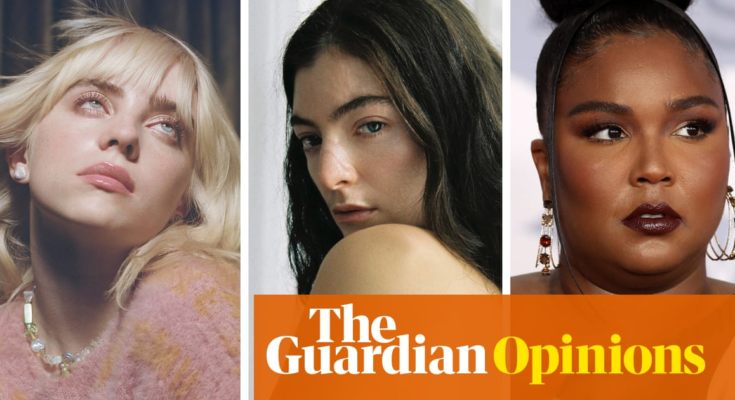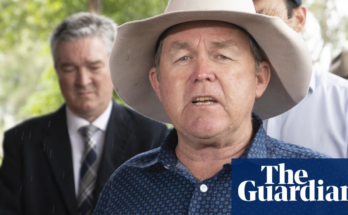New releases by three pop icons reveal their extreme attempts to protect themselves from the damage caused by fame. Pop stardom has never seemed less aspirational
Fri 20 Aug 2021 11.20 EDT
The mechanisms of pop stardom have never been subject to as much scrutiny as they are now. Britney Spears’ conservatorship struggle exposed their potential for (alleged) abuse. Raye recently split from her major label, Polydor, after she reached breaking point and shared her frustrations about not being allowed to release her debut album despite signing in 2014 and helming numerous massive hit singles. Former X Factor winner Rebecca Ferguson has called for a parliamentary inquiry into alleged widespread music industry wrongdoing. That labels should root out exploitative and predatory behaviour and protect exposed young stars is a baseline requirement. But increasingly it seems that the existential state of pop stardom – particularly for young women, subject to greater scrutiny than their male peers and often held to contradictory standards – is intolerable beyond any level of protection.
Lorde’s third album, Solar Power, released today, lingers on the damage that fame wreaked on the New Zealand star, who broke out at 16 and is still only 24. The lyrics describe her as a “teen millionaire having nightmares from the camera flash” and enduring panic attacks before performances of her “fistful of tunes that it’s painful to play”. She explains that she fled fame, with its “poison arrows aimed directly at my head”, as well as the expectation to be a generational voice, to retreat to her New Zealand home town for a more grounded kind of life.
The song California distils this shift: it starts with Lorde remembering the moment when “Carole called my name” – that is, Carole King, who presented her with the Grammy for song of the year, for Royals, in 2014. It also works as a hat-tip to a woman who famously put domesticity before stardom; a spoken-word cameo from Robyn on Secrets from a Girl (Who’s Seen It All) establishes kinship with another teenage pop star who went her own way. There will be cheap gags in unimpressed reviews of Solar Power suggesting this low-key, drifty record will torpedo Lorde’s career for her, and sneers that these are hardly relatable complaints. But she isn’t alone in highlighting the impossibility of staying sane within pop’s infrastructure today.
“Things I once enjoyed just keep me employed now,” Billie Eilish sings on Getting Older, the first song on her recently released second album, Happier Than Ever. Five years younger than Lorde, she has reached the same conclusions one album sooner, forgoing the fantastical horror behind the lyrics of her debut album, When We All Fall Asleep, Where Do We Go?, to detail the depressingly humdrum bogeymen that now stalk her life: untrustworthy lovers, deranged obsessives, paparazzi and trolls waiting to pounce on the faintest hint of a wrong move. She can’t post a picture of herself goofing around with the female co-stars of a music video without being accused of queerbaiting, nor wear a tank top without becoming a lightning rod for debate about body image. None of it sounds fun, and not in the Drake “protesting too much” way.
Creative autonomy and speaking directly to fans via social media mean that Eilish has never had to conceal her antipathy to fame and how it has ruined elements of her life, unlike earlier generations of female pop star who had to sell a whole, shiny, aspirational product. That she doesn’t make her status sound desirable is paradoxically part of her gigantic appeal to authenticity-craving gen Z. And so privacy has become a vanishingly rare commodity, one she flaunts in the lyrics to her new album as if it were a coveted jewel; her current aspirations, she makes clear, are happiness and respect.
The music of Happier Than Ever is also much subtler and slinkier than on Eilish’s debut, for which her producer brother Finneas had to trick her into writing a hit (Bad Guy) at the behest of the label. It’s as if she is tempering expectations and reclaiming space to grow. Her commercial performance has shrunk in tandem: she had just the fifth largest opening week of any 2021 album in the US – a shock considering her stature – and the only first-week records she broke in the US and the UK were for vinyl sales, buoyed by the faithful.
History isn’t exactly littered with musicians who escaped pop stardom unscathed. Pop has a body count and a dazed survivors’ group. As artists have claimed their own voices over the past decade, they have become more open about the toll of visibility and of maintaining an imperial streak as they face down fleeting creative inspiration, commercial pressures and the looming cliff of ageism. “Reinvent yourself, but only in a way that we find to be equally comforting but also a challenge for you,” as Taylor Swift summarised in her 2019 documentary Miss Americana. “Live out a narrative that we find to be interesting enough to entertain us, but not so crazy that it makes us uncomfortable.” Social media has made fame even less tolerable, rife with distorting praise and unfiltered hatred: both Eilish and Lorde quit Twitter in an early strike at self-protection – one that nonetheless is only available to stars who can maintain omnipresence without it.
Another part of the problem is that Eilish and Lorde modelled a new type of teen pop stardom – songwriters first, extruded teen aesthetic beyond what any marketing exec could ever dream up – that nonetheless emerged into the old models of exposure and scrutiny. Both from evidently loving, artsy families, they arrived at fame via songs that blew up on SoundCloud and a media primed to fetishise anyone that chimes strongly with teenagers. (See, too, early YouTube phenom Clairo, whose recent second album, Sling, decried record industry execs staring down her top and how she warped herself to play the part of willing ingenue; it also paid musical homage to Carole King.)
Lizzo had a comparable rise, spending years as an under-the-radar indie rapper before her empowerment singles Good As Hell and Truth Hurts blew up, several years after their initial release. They made her into a global star – but also opened her up to extreme and often conflicting attacks beyond anything that Eilish or Lorde might experience owing to being a visible, confident, Black, fat woman: subject to racism as well as arguments that she panders to a white gaze; fat-shamed but also criticised for sharing her experiences of a juice cleanse.
She attempted to trounce her various haters with her comeback single Rumors – but swathes of the response were so vitriolic that she soon posted footage of herself in tears, unable to comprehend the hate. Facebook stepped in to remove accounts that broke the site’s rules around hate speech, harassment and bullying in their posts on her page.
Her position seems unbearable – and there’s no obvious easy fix. It is Black pop stars such as Beyoncé and Frank Ocean who pioneered the art of self-preservation in the social-media age, disappearing and acting like cult icons despite their towering status to protect their vision. The likes of Lana Del Rey, Swift and Ariana Grande followed suit – but it’s difficult to see how Lizzo could adopt that tactic while still making music that extols pride and confidence, when to vanish would be to tacitly admit that self-assurance isn’t actually enough.
Heightened awareness of the mental health of pop stars only became the norm shockingly recently. That in itself is now used as a marketing tool by which an artist’s personal trauma, and particularly any anguish sustained from their industry experiences, no longer derails their careers but is folded into the overall package, “proof” of their authenticity and distance from the era when pop stars were expected to be contrivances (and often derided for it). It doesn’t really feel like progress – more the music industry having it both ways. And, as the likes of Megan Thee Stallion have found, being open about your trauma can simply create more fodder for committedly cruel trolls.
Eilish and Lorde’s latest releases chime with a moment of societal refusal, firmly stating what they need in order to protect their mental health and mirroring a turn away from hustle culture towards more intimate forms of self-protection and fulfilment. Making lower-key music in the face of rabid expectation feels like applying aloe vera to a burn, and accepting a sales hit a potential way to establish a sustainable path forward long term – Lorde has said she isn’t worried that her environmentally friendly “music box” release, a replacement for the CD, won’t count towards the Billboard charts.
Perhaps we are on the brink of a watershed, definitively ending the 1.0 era of conquering pop behemoths (from Madonna to Katy Perry) that the New York Times tolled the bell for three years ago. But individual solutions can only go so far: labels will simply fill any roles vacated. Obsolescence is built into a system that works against survival.
Returning to X Factor, it is telling that the producers have chosen to end the show now. Presumably it is slinking out the door while mired in allegations about the mistreatment and abuse of past contestants. And the format is outdated – fans now mint pop stars with likes and viral dances, not calling a premium-rate phone line once a week. But it’s also hard to imagine who would sign up to be a pop star in 2021 with everything we know now – and hard, too, to reckon with the ethics of pop fandom when that attention only inflames a merciless and exploitative existence.
{{topLeft}}
{{bottomLeft}}
{{topRight}}
{{bottomRight}}
{{/ticker}}
{{heading}}
{{#paragraphs}}
{{.}}
{{/paragraphs}}{{highlightedText}}



